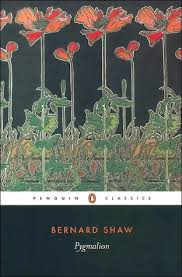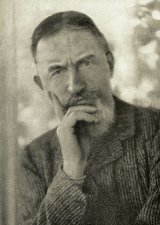Pygmalion Page #22
Pygmalion is a play by George Bernard Shaw, named after a Greek mythological figure. It was first presented on stage to the public in 1913. In ancient Greek mythology, Pygmalion fell in love with one of his sculptures, which then came to life.
HIGGINS. I know you can. I told you you could. LIZA [wounded, getting away from him to the other side of the ottoman with her face to the hearth] I know you did, you brute. You wanted to get rid of me. HIGGINS. Liar. LIZA. Thank you. [She sits down with dignity]. HIGGINS. You never asked yourself, I suppose, whether I could do without YOU. LIZA [earnestly] Don't you try to get round me. You'll HAVE to do without me. HIGGINS [arrogant] I can do without anybody. I have my own soul: my own spark of divine fire. But [with sudden humility] I shall miss you, Eliza. [He sits down near her on the ottoman]. I have learnt something from your idiotic notions: I confess that humbly and gratefully. And I have grown accustomed to your voice and appearance. I like them, rather. LIZA. Well, you have both of them on your gramophone and in your book of photographs. When you feel lonely without me, you can turn the machine on. It's got no feelings to hurt. HIGGINS. I can't turn your soul on. Leave me those feelings; and you can take away the voice and the face. They are not you. LIZA. Oh, you ARE a devil. You can twist the heart in a girl as easy as some could twist her arms to hurt her. Mrs. Pearce warned me. Time and again she has wanted to leave you; and you always got round her at the last minute. And you don't care a bit for her. And you don't care a bit for me. HIGGINS. I care for life, for humanity; and you are a part of it that has come my way and been built into my house. What more can you or anyone ask? LIZA. I won't care for anybody that doesn't care for me. HIGGINS. Commercial principles, Eliza. Like [reproducing her Covent Garden pronunciation with professional exactness] s'yollin voylets [selling violets], isn't it? LIZA. Don't sneer at me. It's mean to sneer at me. HIGGINS. I have never sneered in my life. Sneering doesn't become either the human face or the human soul. I am expressing my righteous contempt for Commercialism. I don't and won't trade in affection. You call me a brute because you couldn't buy a claim on me by fetching my slippers and finding my spectacles. You were a fool: I think a woman fetching a man's slippers is a disgusting sight: did I ever fetch YOUR slippers? I think a good deal more of you for throwing them in my face. No use slaving for me and then saying you want to be cared for: who cares for a slave? If you come back, come back for the sake of good fellowship; for you'll get nothing else. You've had a thousand times as much out of me as I have out of you; and if you dare to set up your little dog's tricks of fetching and carrying slippers against my creation of a Duchess Eliza, I'll slam the door in your silly face. LIZA. What did you do it for if you didn't care for me? HIGGINS [heartily] Why, because it was my job. LIZA. You never thought of the trouble it would make for me. HIGGINS. Would the world ever have been made if its maker had been afraid of making trouble? Making life means making trouble. There's only one way of escaping trouble; and that's killing things. Cowards, you notice, are always shrieking to have troublesome people killed. LIZA. I'm no preacher: I don't notice things like that. I notice that you don't notice me. HIGGINS [jumping up and walking about intolerantly] Eliza: you're an idiot. I waste the treasures of my Miltonic mind by spreading them before you. Once for all, understand that I go my way and do my work without caring twopence what happens to either of us. I am not intimidated, like your father and your stepmother. So you can come back or go to the devil: which you please. LIZA. What am I to come back for? HIGGINS [bouncing up on his knees on the ottoman and leaning over it to her] For the fun of it. That's why I took you on. LIZA [with averted face] And you may throw me out tomorrow if I don't do everything you want me to? HIGGINS. Yes; and you may walk out tomorrow if I don't do everything YOU want me to. LIZA. And live with my stepmother? HIGGINS. Yes, or sell flowers. LIZA. Oh! if I only COULD go back to my flower basket! I should be independent of both you and father and all the world! Why did you take my independence from me? Why did I give it up? I'm a slave now, for all my fine clothes. HIGGINS. Not a bit. I'll adopt you as my daughter and settle money on you if you like. Or would you rather marry Pickering? LIZA [looking fiercely round at him] I wouldn't marry YOU if you asked me; and you're nearer my age than what he is. HIGGINS [gently] Than he is: not "than what he is." LIZA [losing her temper and rising] I'll talk as I like. You're not my teacher now. HIGGINS [reflectively] I don't suppose Pickering would, though. He's as confirmed an old bachelor as I am. LIZA. That's not what I want; and don't you think it. I've always had chaps enough wanting me that way. Freddy Hill writes to me twice and three times a day, sheets and sheets. HIGGINS [disagreeably surprised] Damn his impudence! [He recoils and finds himself sitting on his heels]. LIZA. He has a right to if he likes, poor lad. And he does love me. HIGGINS [getting off the ottoman] You have no right to encourage him. LIZA. Every girl has a right to be loved. HIGGINS. What! By fools like that? LIZA. Freddy's not a fool. And if he's weak and poor and wants me, may be he'd make me happier than my betters that bully me and don't want me. HIGGINS. Can he MAKE anything of you? That's the point. LIZA. Perhaps I could make something of him. But I never thought of us making anything of one another; and you never think of anything else. I only want to be natural. HIGGINS. In short, you want me to be as infatuated about you as Freddy? Is that it? LIZA. No I don't. That's not the sort of feeling I want from you. And don't you be too sure of yourself or of me. I could have been a bad girl if I'd liked. I've seen more of some things than you, for all your learning. Girls like me can drag gentlemen down to make love to them easy enough. And they wish each other dead the next minute. HIGGINS. Of course they do. Then what in thunder are we quarrelling about? LIZA [much troubled] I want a little kindness. I know I'm a common ignorant girl, and you a book-learned gentleman; but I'm not dirt under your feet. What I done [correcting herself] what I did was not for the dresses and the taxis: I did it because we were pleasant together and I come--came--to care for you; not to want you to make love to me, and not forgetting the difference between us, but more friendly like. HIGGINS. Well, of course. That's just how I feel. And how Pickering feels. Eliza: you're a fool. LIZA. That's not a proper answer to give me [she sinks on the chair at the writing-table in tears]. HIGGINS. It's all you'll get until you stop being a common idiot. If you're going to be a lady, you'll have to give up feeling neglected if the men you know don't spend half their time snivelling over you and the other half giving you black eyes. If you can't stand the coldness of my sort of life, and the strain of it, go back to the gutter. Work til you are more a brute than a human being; and then cuddle and squabble and drink til you fall asleep. Oh, it's a fine life, the life of the gutter. It's real: it's warm: it's violent: you can feel it through the thickest skin: you can taste it and smell it without any training or any work. Not like Science and Literature and Classical Music and Philosophy and Art. You find me cold, unfeeling, selfish, don't you? Very well: be off with you to the sort of people you like. Marry some sentimental hog or other with lots of money, and a thick pair of lips to kiss you with and a thick pair of boots to kick you with. If you can't appreciate what you've got, you'd better get what you can appreciate.
Translation
Translate and read this book in other languages:
Select another language:
- - Select -
- 简体中文 (Chinese - Simplified)
- 繁體中文 (Chinese - Traditional)
- Español (Spanish)
- Esperanto (Esperanto)
- 日本語 (Japanese)
- Português (Portuguese)
- Deutsch (German)
- العربية (Arabic)
- Français (French)
- Русский (Russian)
- ಕನ್ನಡ (Kannada)
- 한국어 (Korean)
- עברית (Hebrew)
- Gaeilge (Irish)
- Українська (Ukrainian)
- اردو (Urdu)
- Magyar (Hungarian)
- मानक हिन्दी (Hindi)
- Indonesia (Indonesian)
- Italiano (Italian)
- தமிழ் (Tamil)
- Türkçe (Turkish)
- తెలుగు (Telugu)
- ภาษาไทย (Thai)
- Tiếng Việt (Vietnamese)
- Čeština (Czech)
- Polski (Polish)
- Bahasa Indonesia (Indonesian)
- Românește (Romanian)
- Nederlands (Dutch)
- Ελληνικά (Greek)
- Latinum (Latin)
- Svenska (Swedish)
- Dansk (Danish)
- Suomi (Finnish)
- فارسی (Persian)
- ייִדיש (Yiddish)
- հայերեն (Armenian)
- Norsk (Norwegian)
- English (English)
Citation
Use the citation below to add this book to your bibliography:
Style:MLAChicagoAPA
"Pygmalion Books." Literature.com. STANDS4 LLC, 2025. Web. 11 Jan. 2025. <https://www.literature.com/book/pygmalion_78>.




Discuss this Pygmalion book with the community:
Report Comment
We're doing our best to make sure our content is useful, accurate and safe.
If by any chance you spot an inappropriate comment while navigating through our website please use this form to let us know, and we'll take care of it shortly.
Attachment
You need to be logged in to favorite.
Log In